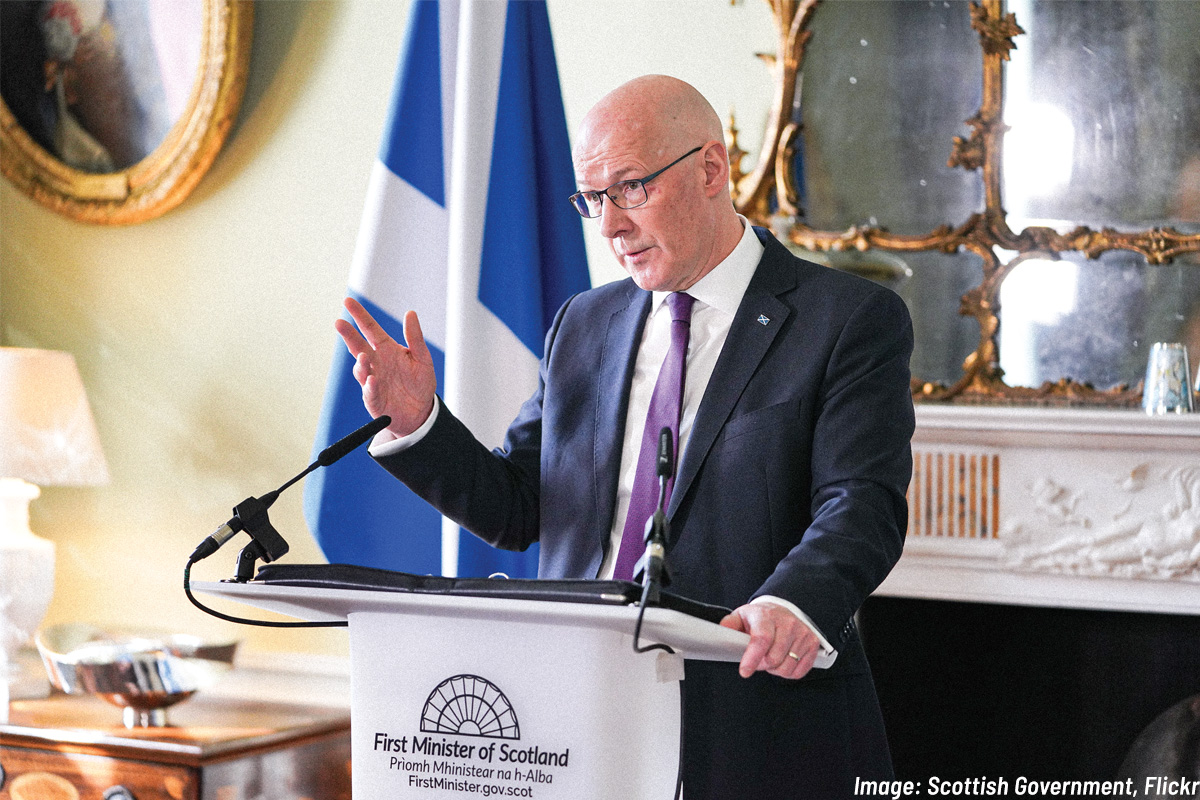On Thursday history was made as the
Scottish National Party, who only a decade ago seemed destined to play
second fiddle to the Labour Party in Scottish politics, became the first
party in the Scottish Parliament’s twelve year history to form a single
party majority. More importantly, for the first time there is a
pro-independence majority in the Parliament, and consequently a
referendum on whether Scotland should leave the United Kingdom will be
held within the next five year term.
On Thursday history was made as the
Scottish National Party, who only a decade ago seemed destined to play
second fiddle to the Labour Party in Scottish politics, became the first
party in the Scottish Parliament’s twelve year history to form a single
party majority. More importantly, for the first time there is a
pro-independence majority in the Parliament, and consequently a
referendum on whether Scotland should leave the United Kingdom will be
held within the next five year term.
The
Labour Party’s performance in terms of seats was very bad, in what the
Party tops have long considered their safest stomping ground. Labour
lost seven seats overall; more importantly it lost twenty
constituencies, the figure being topped up by seats on the regional
lists, which are designed to even out constituency gains and make the
result more proportional. One after the other previously safe Labour
seats in West and Central Scotland fell to grinning Nationalists.
Needless to say the Scottish Labour leader, Iain Gray, had announced his
resignation by the next day.
Why the Nationalists won
So
does this mark an increasingly nationalist feeling amongst Scots, are
they champing at the bit to get out of the Union? In short: no. Opinion
polls consistently put support for independence at around 25-30% and
there has been no major upswing to accompany the SNP’s sweep to power.
There is one single reason why the Nationalists won on May 5. They ran a
campaign that was, both on paper and in style, to the left of Labour.
However, Salmond is in no way an undercover socialist (he was an
economist at RBS once), and there were clear signs of pro-big business
political alignment in the SNP programme. Salmond was unashamed in
promising a five year public sector pay-freeze, which is a cut, possibly
a big one, in real terms with inflation as high as it is. The day after
his victory he was demanding corporation tax powers for Edinburgh in
order to “keep Scotland’s economy competitive”, which can only be read
as a cut in tax for big business.
However, on the campaign trail
it was a few key centre-left policies he was pushing: maintenance of
free-prescriptions, no introduction of student contributions in higher
education and investment in infrastructure to create jobs. The main
concern of working class people in Scotland is the cuts. Scotland is
very reliant on the public sector and, due to a deal Salmond struck with
Cameron, the cuts have not yet fully hit the economy. Scottish workers
sense a return to the dark days of Thatcher and voted for the party that
talked most about investment and jobs. Labour did match some of the key
SNP pledges, but only after the SNP had made them. They were playing
catch-up the whole campaign. The Labour leadership completely misjudged
the mood and tried to fight the SNP by standing to their right on law
and order (promising an automatic six month jail sentence for those
carrying knives) and by trying to whip up fears over independence. Most
Scottish people know that you can vote for the SNP and then vote down
separation at a subsequent referendum but there is only one chance to
vote in a Scottish Government that might protect you from the worst of
the cuts. They chose the Nationalists.
The failure of “centre-ground” politics
Results of elections on 5 May. SNP in yellow, Labour in red, Conservatives in blue and LibDem in orange.The
result is a warning to those in the Labour Party who continue to claim
that electoral success depends on “capturing the centre-ground”. In
Scotland, during the most vicious Tory Government in generations, a
Labour victory should have been guaranteed. Indeed, it looked like a
Labour victory was a dead cert: opinion polls earlier this January put
Labour on 49% of the constituency poll and 47% of the regional list. Yet
Labour could only manage 31.7% and 26.3% at the ballot box last week,
behind the nationalists on 45.4% in the constituency vote and 44% on the
regional list. This reflected Labour’s woeful campaign where they stood
more to “the centre” than the SNP and consequently lost resoundingly.
If Labour had stood on a programme based on setting a budget refusing to
implement cuts from Westminster by implementing a defiance budget they
could have won a landslide victory. Instead Labour slumped to their
lowest levels since the first devolved parliament elections in 1999.
The
fact is that the current Labour leadership were not willing to
implement such a programme. Iain Gray would have pushed through the cuts
of Cameron and Clegg for them, as will Alex Salmond. The Nationalists
will have no alternative but to make cuts because the Scottish
Government block grant has been cut in line with other British
departments. Salmond has talked about building houses, infrastructure
projects, investment in renewable energy sources etc., but he still
hasn’t told us how he’s going to pay for them. He will be forced by
necessity to make huge cuts, despite his promises during the election.
Scotland’s Constitutional Future
The
SNP victory throws Britain’s constitutional future wide open. It was
only in the last week of the campaign that an independence referendum
was mentioned by the SNP and this was only to assure everyone that no
bill would be brought forward until the second half of their term in
office. Salmond’s strategy has been to talk about independence as little
as possible, and bide his time until further into the Tory-Lib Dem
Westminster government, when there might be more of an appetite for
independence. But despite his best efforts, the national question has
reared its head, if only because of the SNP landslide. The Westminster
government has said that it will not stand in the way of a referendum,
and will allow the Scottish Government to set the question, probably
knowing that any interference on their part would probably serve to make
the idea of separation more popular.
As socialists we cannot lose
sight of the real issues at stake regarding the national question.
Nationalism is a blind alley, particularly under the current conditions
of crisis. The SNP have made it clear that they are willing to force
Scotland into a race to the bottom through lowering corporation tax and
before the crash in 2008 cited Scotland as potentially ranking alongside
Ireland and Iceland in the so-called “Nordic arc of prosperity.” The
Labour Party leadership has responded to the SNP with a defensive call
not to break up the union, but this is not a meaningful alternative to
workers and youth facing cuts to their living standards.
Autonomy and the Labour Movement
We
support full economic powers for a Scottish parliament, not out of a
romantic nationalist sentimentality but because these powers could be
used by Labour to propose and implement socialist policies, around which
it could mobilise the labour movement in both Scotland and Britain as a
whole against the Tory government.
In an age when big business is
international, fighting struggles on national lines is limited. A
Scottish Parliament, with full tax and spending powers, following a
socialist economic policy would be a model to mobilise the whole British
labour movement. There can be no socialist solution to this crisis in
Scotland alone, as the big banks and corporations are based in London.
We need to fight alongside our sisters and brothers south of the border,
with an end goal of nationalising the City of London for the benefit of
all the peoples of these islands.
For a Socialist Programme in Scotland
The
Nationalists victory has made independence the issue of the day, and it
should be answered as soon as possible. Whilst we are opposed to
independence, we have always argued for an immediate referendum, as we
believe the people of Scotland have the right to choose their
constitutional future. A two question referendum must be called within
the next year, the first question asking for full fiscal autonomy for
the Scottish Parliament and the second on independence. If Labour was
willing to campaign on these demands, and demonstrate how it would use
extended financial powers to challenge Tory austerity, it could regain
the trust it has lost through years of right-wing policies at
Westminster and Holyrood. A socialist Scotland as a fighting example
within the UK would be a serious challenge not just to the Tories, but
to the whole capitalist system.
- An immediate referendum on Scotland’s future with voters given the option of fiscal autonomy
- Full tax raising and spending powers for the Scottish Parliament
- Labour to fight on a socialist economic programme
- A socialist plan of job creation and investment to challenge the Tory cuts
- Nationalise the banks and big businesses based in London whose system causes misery for all the working people of Britain
- Fighting for a socialist federation of Britain






